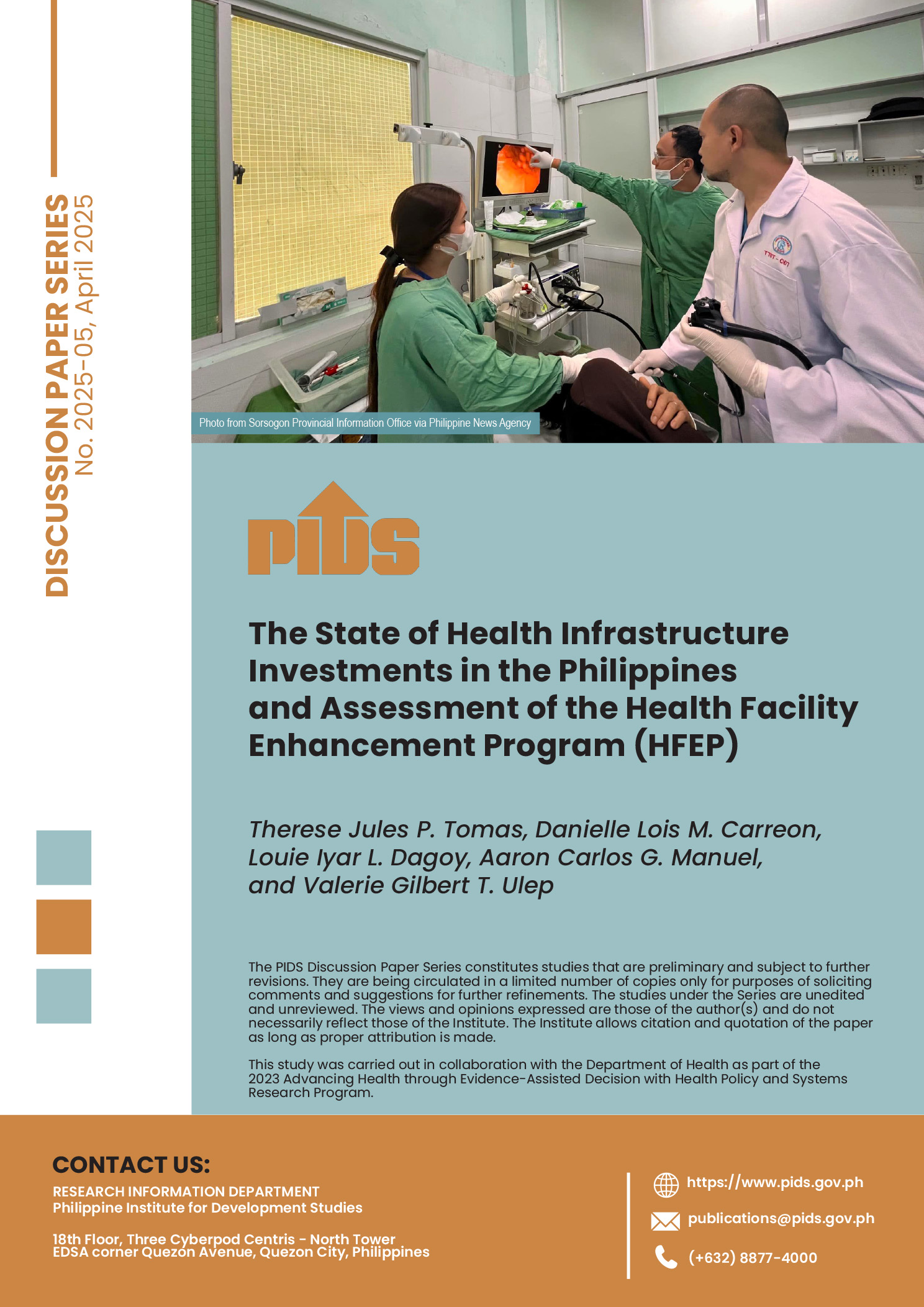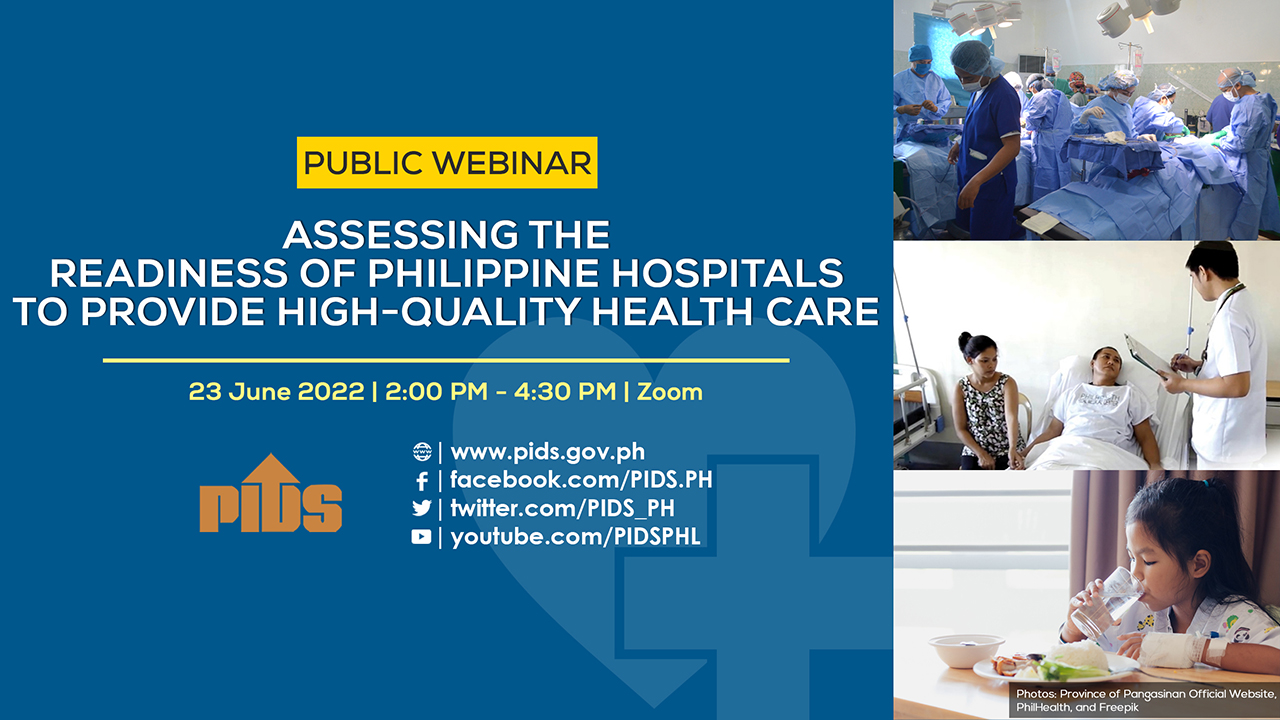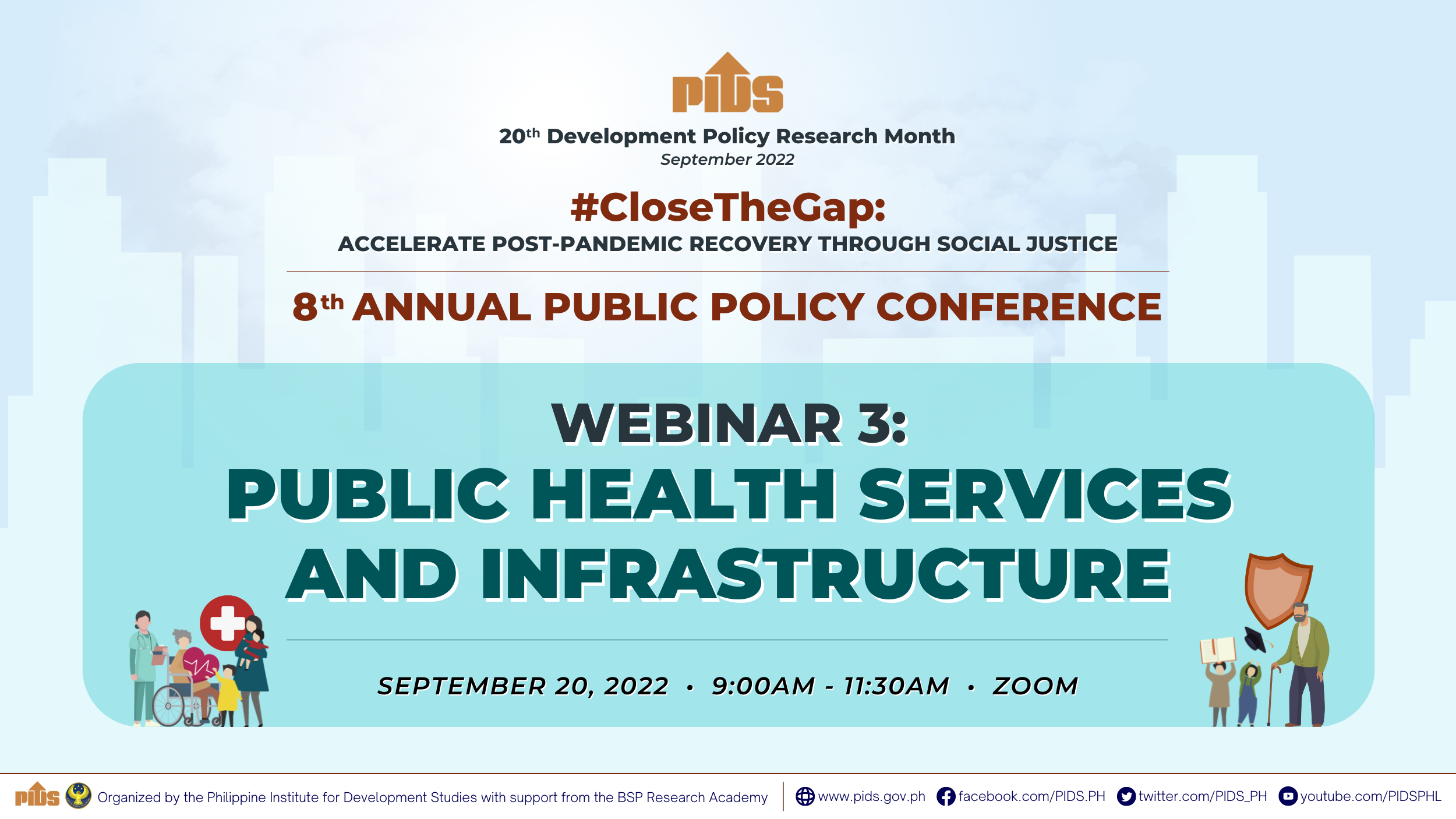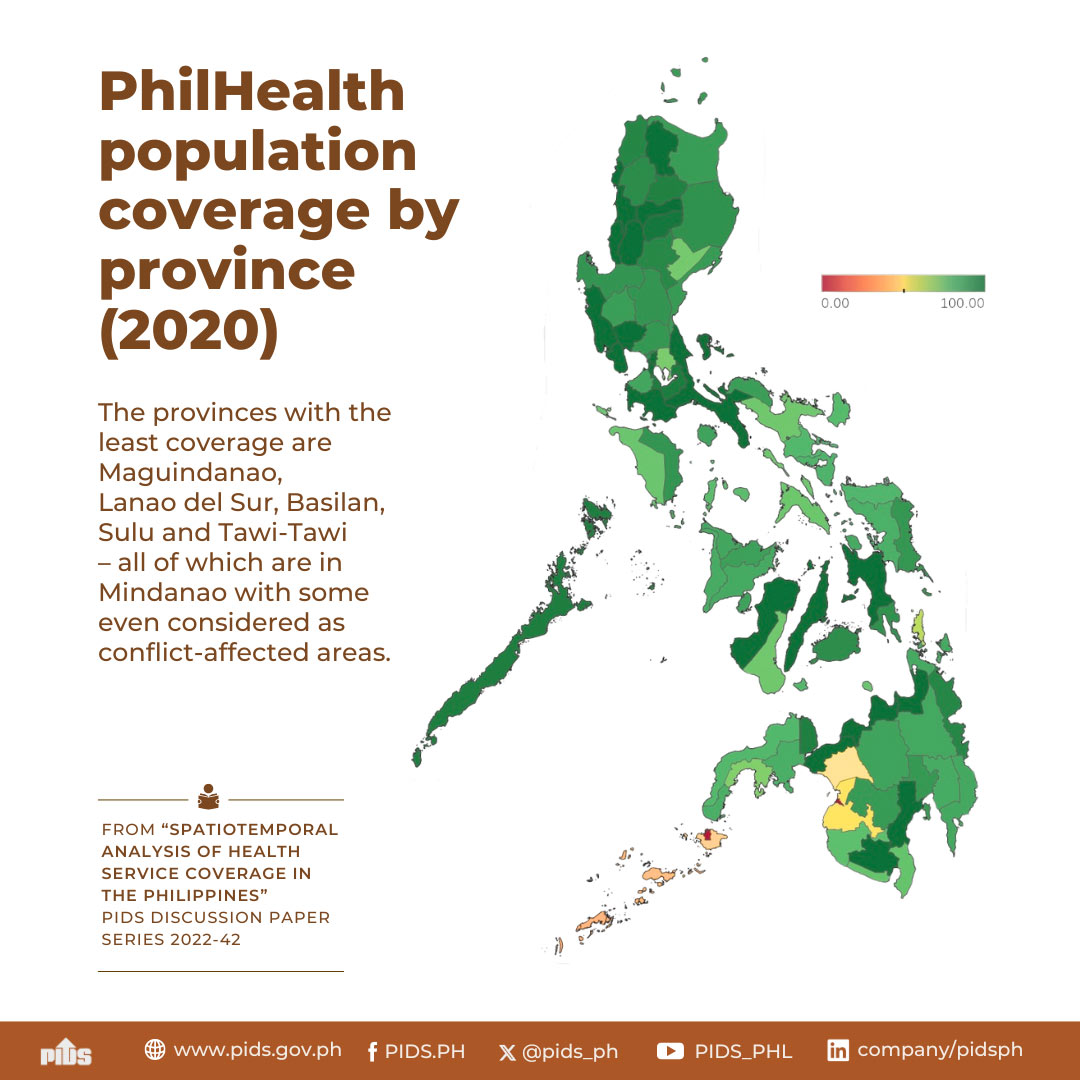
The global budget payment (GBP) system, wherein hospitals are given a certain amount that will cover all inpatient services for members of the Philippine Health Insurance Corp. (PhilHealth) for the entire year, is found to be more efficient than the current case-based payment (CBP) scheme.
In 2011, PhilHealth started implementing the case-based payment system in lieu of the traditional fee-for-service in paying hospitals for a group of materials and services required for the treatment of certain conditions. Currently, the CBP covers 23 of the most common conditions and procedures, which represent 50 percent of total claims to PhilHealth. The goal of the CBP is to increase cost efficiency and transparency in provider payment mechanisms.
However, the possible increase in reimbursement efficiency of CBP as envisioned by PhilHealth did not seem to be translated in hospitals.
In a study commissioned by state think tank Philippine Institute for Development Studies (PIDS), it was noted that the CBP works as a retrospective payment mechanism where hospitals are reimbursed a given amount after filing a claim for a given case, with reimbursement time spanning within 4 to 5 months. Hilton Lam, author of the study, also noted that CBP scheme resulted in an increase of out-of-pocket expense.
"As CBP replaced the fee-for-service, it was found out that the amount reimbursed by PhilHealth from the case rates was not sufficient to cover hospital expenses. Majority of the admissions in which patients shoulder the remaining expenses not covered by the CBP scheme goes to balance billing," he explained.
Lam pointed out additional drawbacks of the CBP scheme such as high administrative cost of screening cases and potential decrease in quality of care due to providers avoiding complex cases or not giving the appropriate level of care.
The PIDS study is therefore recommending for PhilHealth to consider the GBP as an alternative payment mechanism for improving efficiency and decreasing transaction costs. This should be implemented together with an efficient and improved CBP and strict implementation of the no balance billing (NBB).
The global budget payment system was formulated in 2012 and covers all PhilHealth members in nonprivate accommodations. However, it has not been implemented due to lack of hospital capacity particularly on information systems. Nevertheless, Lam believes this scheme is a potential cost-containment mechanism that can be used to support the Department of Health’s Kalusugan Pangkalahatan or Universal Health Care program, which has the goal of ensuring that all Filipinos especially the poor receive the benefits of health reform.
Under the GBP scheme, government hospitals should submit their applications to be considered under the program with priority given to facilities that meet certain criteria, such as those with at least 90 percent bed capacity dedicated to nonprivate accommodations, centers of quality and referral hospitals, hospitals connected to eClaims facility, and local government unit hospitals implementing province-wide programs to ensure high PhilHealth enrolment.
Unlike the CBP, GBP would be a prospective payment mechanism in which hospitals would be given funds to cover future claims. This prospective mechanism could cut administrative costs and make payment to providers more efficient by giving funds in advance to avoid reimbursement delays.
The study also stressed the need to update the costing of case rates by determining their approximate fair market prices and to monitor indicators of hospital performance and quality of care.
"This should be determined through a costing study that can be outsourced by PhilHealth. Since the case rates will be the basis of calculating the global budget, adequate funds should be provided to hospitals to avoid patient dumping or skimping on services. Consultations between PhilHealth and involved hospitals should also be included in the annual budgeting process," Lam suggested.
Likewise, the study proposed that PhilHealth look into the investment needs of hospitals to comply with the global budget requirements.
"There should be an analysis of the investment needs of hospitals to comply with the global budget requirements. Based on the assessment of PhilHealth, hospitals cannot comply with the technology requirements of the GBPP. If PhilHealth still plans to implement GBPP, hospitals should be given adequate preparation time and resources to meet these requirements," Lam noted.
Lastly, the study recommended that PhilHealth should monitor indicators for efficiency and quality of care under the GBP. Possible indicators include bed occupancy rate, readmission rate, length of stay, frequency of complications, and compliance to CPGs. The electronic database can be used for real-time monitoring aside from the planned biannual facility assessments. ###
In 2011, PhilHealth started implementing the case-based payment system in lieu of the traditional fee-for-service in paying hospitals for a group of materials and services required for the treatment of certain conditions. Currently, the CBP covers 23 of the most common conditions and procedures, which represent 50 percent of total claims to PhilHealth. The goal of the CBP is to increase cost efficiency and transparency in provider payment mechanisms.
However, the possible increase in reimbursement efficiency of CBP as envisioned by PhilHealth did not seem to be translated in hospitals.
In a study commissioned by state think tank Philippine Institute for Development Studies (PIDS), it was noted that the CBP works as a retrospective payment mechanism where hospitals are reimbursed a given amount after filing a claim for a given case, with reimbursement time spanning within 4 to 5 months. Hilton Lam, author of the study, also noted that CBP scheme resulted in an increase of out-of-pocket expense.
"As CBP replaced the fee-for-service, it was found out that the amount reimbursed by PhilHealth from the case rates was not sufficient to cover hospital expenses. Majority of the admissions in which patients shoulder the remaining expenses not covered by the CBP scheme goes to balance billing," he explained.
Lam pointed out additional drawbacks of the CBP scheme such as high administrative cost of screening cases and potential decrease in quality of care due to providers avoiding complex cases or not giving the appropriate level of care.
The PIDS study is therefore recommending for PhilHealth to consider the GBP as an alternative payment mechanism for improving efficiency and decreasing transaction costs. This should be implemented together with an efficient and improved CBP and strict implementation of the no balance billing (NBB).
The global budget payment system was formulated in 2012 and covers all PhilHealth members in nonprivate accommodations. However, it has not been implemented due to lack of hospital capacity particularly on information systems. Nevertheless, Lam believes this scheme is a potential cost-containment mechanism that can be used to support the Department of Health’s Kalusugan Pangkalahatan or Universal Health Care program, which has the goal of ensuring that all Filipinos especially the poor receive the benefits of health reform.
Under the GBP scheme, government hospitals should submit their applications to be considered under the program with priority given to facilities that meet certain criteria, such as those with at least 90 percent bed capacity dedicated to nonprivate accommodations, centers of quality and referral hospitals, hospitals connected to eClaims facility, and local government unit hospitals implementing province-wide programs to ensure high PhilHealth enrolment.
Unlike the CBP, GBP would be a prospective payment mechanism in which hospitals would be given funds to cover future claims. This prospective mechanism could cut administrative costs and make payment to providers more efficient by giving funds in advance to avoid reimbursement delays.
The study also stressed the need to update the costing of case rates by determining their approximate fair market prices and to monitor indicators of hospital performance and quality of care.
"This should be determined through a costing study that can be outsourced by PhilHealth. Since the case rates will be the basis of calculating the global budget, adequate funds should be provided to hospitals to avoid patient dumping or skimping on services. Consultations between PhilHealth and involved hospitals should also be included in the annual budgeting process," Lam suggested.
Likewise, the study proposed that PhilHealth look into the investment needs of hospitals to comply with the global budget requirements.
"There should be an analysis of the investment needs of hospitals to comply with the global budget requirements. Based on the assessment of PhilHealth, hospitals cannot comply with the technology requirements of the GBPP. If PhilHealth still plans to implement GBPP, hospitals should be given adequate preparation time and resources to meet these requirements," Lam noted.
Lastly, the study recommended that PhilHealth should monitor indicators for efficiency and quality of care under the GBP. Possible indicators include bed occupancy rate, readmission rate, length of stay, frequency of complications, and compliance to CPGs. The electronic database can be used for real-time monitoring aside from the planned biannual facility assessments. ###












